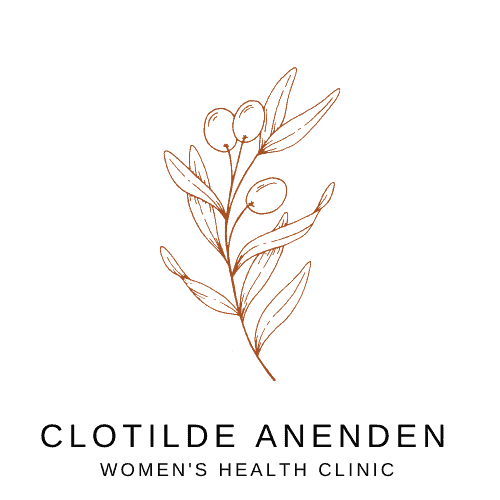Have you been diagnosed with PCOS and wondering what to do next?
Have you been researching Polycystic ovarian syndrome online and were left confused by the abundance of contradicting information online?
Here are the 5 myths about PCOS I will go through in depth for you:
I won’t be able to fall pregnant naturally
I’m lean/slim – it’s not possible I have PCOS
The pill is the only way to ‘treat’ PCOS symptoms
Nothing else can be done
Myoinositol will cure my PCOS

1. I won’t be able to fall pregnant naturally
Fertility and PCOS are often strongly associated in the press, social media and … at your doctor’s diagnosis appointment.
More often than not – this was also my personal case – the doctor announces that you have PCOS, offers you to go on the pill to better manage your symptoms (more on this just below- see point 3) and mentions that you may struggle falling pregnant. And that when the time is right to come back and see them for some further medication help.
In PCOS ovulation is often disrupted, it may be inexistent for a few years, it may happen every few cycles. As a result your cycle length changes, you may have irregular periods or they may have gone missing all together.
But our cycle can improve with lifestyle changes, usually involving nutrition, blood sugar balancing work, optimising gut health and sleep, supporting adrenal glands and our stress response, supporting the liver and the wonderful detoxification job that it does for us.
And by improvement, I mean our cycle can become more regular, our cervical mucus can even make a healthy appearance, we can have a long enough luteal phase (post ovulation) to ensure a good implantation and healthy progesterone levels.
So don’t believe anyone who says PCOS makes you infertile. And focus your energy on preparing your body for conception if you’d like to start a family, by putting efforts in understanding what is causing your PCOS in the first place and starting to address this in the first instance. I can help you do exactly that if you would like somebody to guide you along the way.
2. I’m lean and slim, it’s not possible I have PCOS
Well, I wish this was true, but unfortunately, even though commonly women suffering with PCOS tend to put on weight and struggle to lose it, it is also possible to be lean and have PCOS.
In fact, it is estimated that 20% of women with PCOS have normal BMI. So really it isn’t that simple. There are many dimensions involved in PCOS including your liver health, your gut health but also your circadian rhythm, your stress levels. All of these do not always impact your weight but may still impact your hormone production and detoxification.

3. The pill is the only way to ‘treat PCOS’
This is a very common story, one I hear so often in the clinic with my clients. They have been put on the pill in the hope to wish away all those disheartening PCOS symptoms: acne, weight gain, irregular periods, hirsutism, hair loss…
The pill works by putting your cycle on pause, as if it went dormant. Some symptoms may well decrease or go away… until the pill is stopped.
And then your cycle resumes…where it left off and similar (or worst) symptoms reappear.
So the pill really does not treat anything. It just presses the button PAUSE. And sometimes that pause can be valuable, it can allow us to regroup. But other times it makes us waste precious years where we could have been dealing with the root causes of our PCOS and those disheartening symptoms, without depleting us from precious nutrients or causing undesirable secondary effects.
Also, please know the hormonal contraceptive pill may well also be causing some PCOS-like symptoms when we stop it, it does not mean that you have PCOS per say if you had never been diagnosed.
4. Nothing else can be done
A lot can be done.
Firstly, assessing your symptoms, making sure you were rightly diagnosed or that you are getting a proper diagnosis if you yet haven’t. It is very important to distinguish between PCOS-like symptoms (including ovaries with polycystic appearance) and being diagnosed with PCOS (not just based on a scan of your ovaries).
Once the diagnosis is done – understanding the root causes at play with your PCOS is key. This work can be done with a practitioner. In my experience there is rarely only one thing. You may not have just ‘one type’ of PCOS. The PCOS typology is only just a way to explain how various factors may be implicated: insulin resistance, inflammation, adrenal, post-pill, or other hidden cause. This requires a skilled practitioner that takes the time to go through your medical history, antecedents but also understands all of your symptoms (not just in the gynaecological down south area), but also your diet, sleep hygiene and lifestyle in general. Now this takes time, way more than a 10-minute consultation can unfortunately achieve.
Putting a personalised program in place which depending on your unique circumstances will prioritise the right steps for you: do we need to focus on your digestive health first as you may already be eating healthily and taking all the supplements but actually, we are not sure you are digesting it all properly? Do we need to focus on supporting your liver in detoxifying those used hormones that keep causing all kinds of symptoms? Do we need to start working on your blood sugar balance as those sugar cravings keep annoying you? Is stress preventing you from losing any weight at all?…
5. Inositol will cure PCOS
No amount of supplements can cure PCOS. PCOS is a condition and we usually have it for life. However, we can manage symptoms and address root causes to feel a lot better.
In my experience supplements – like inositol – can be a huge help, but they will never get you all the way. The foundations of a nourishing and balanced plate, regular good quality sleep, movement and relaxation are pillars of health. Without those, no pills will do much for you.
In addition, when choosing supplements we want to ensure that they are: in the right bio available form (one that your body can use and easily absorb), from a reputable source, with a therapeutic dosage, without secondary effects, not contraindicated with any medication you may be taking… the list goes on. This is why seeking professional advice is key. So that supplementation can be tailored to your needs, taken safely and reviewed regularly.
That being said, inositol may be a fantastic help in the context of addressing blood sugar imbalance or protecting your ovocytes (egg) quality for a future baby.
I share more PCOS specific and hormonal health general content on my newsletter so feel free to subscribe to know more!



